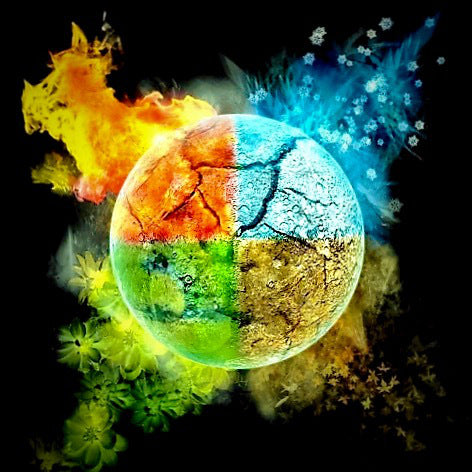Fire, water, earth, air... The mystical quartet, which has been the subject of many great thinkers who set out to understand the source of life since ancient times. In this article, we will talk about A Historical And Philosophy View Of The Hidden World Of The Elements.
The secret world of the elements has been wondering about by many people. There is such a mysterious world of the elements, which are the upper titles they belong to, that one can feel more and more lost the more they go into it. Come, join us on this journey. Be a part of this world that inspires us in our new collections; Let the secret world of the elements guide us.
Where Does the Word Element Come From?
How would you like to start the journey into the secret world of the elements that we will discover, with the knowledge of where the word element comes from? Derived from the Greek word "elementa", "element" means "to climb the first rung of a ladder". This meaning is also interpreted as 'the first elements of a science or method'.
In ancient times, it was said that everything in the universe consisted of 4 elements: fire, air, water, and earth. Who was saying? Wait, we're not there yet, let's talk about Ionian philosophy first. There was a school founded on the Aegean coast of Anatolia at the end of the 7th century BC: the Ionian School. Among the scientists of this school, which was located in Ionia consisting of city-states such as Ephesus, Milet, Izmir, and Didim, there were names such as Thales, Anaximenes, and Heraclitus. I specifically say 'scientist' because each of them is against the mythological point of view that has prevailed until that day; They were pioneers at the beginning of philosophy and science, focusing on methods such as observation of natural phenomena, research, methods, and progress. Let's get to know them better.

The Hidden World of the Elements
Thales of Miletus, who lived between 624 BC and 546 BC, said that "the nature of things is water". According to him, the main substance of every being we see in the universe was water. Who knows, perhaps Thales was inspired by the proposition that "the first state of the world consisted of a body of water" engraved in the history pages of the Babylonian creation myth, Enuma Elish, in the 1100s BC.
Then we met Anaximenes, a naturalist, in the pages of history. His focus was air. He used to say that "as long as a person lives, he breathes and as he breathes, the soul resides in the body, when breathing stops, the soul and therefore life leaves the body, then the source of everything is air." So what he meant was this; We must have a soul to live, and it is the air we breathe that creates our soul. If air gives us life, it must give it to the universe just as it gives us. The center of the theory of Heraclitus of Ephesus, who lived between 550 - 480 BC, was the fire. He said that fire could take any form, and thus he associated the fire element with the quality of mobility.

Empedocles, on the other hand, though very differently about the hidden world of the elements. So much so that he was the first to introduce the 4 elements of philosophy. He put forward the idea that the roots of the universe, arche, are based on the elements of fire, water, earth, and air, and that the combinations of these elements are the creators of everything we call 'being'. As you can see, until now the Ionian philosophers had studied the elements of fire, water, and air in detail, but by adding earth to this trio, it was Empedocles who laid the foundations of the 4 elements doctrine.
Aristotle, one of the ancient Greek philosophers, said, “The quartet rhythm dominates the universe. Although he agreed with Empedocles's proposition by saying that the structure of everything animate and inanimate was composed of four main elements, he had an addition: According to him, each element contains two of the elements of 'heat, dryness, wetness, and coldness', and this was the basis of the transformations in the universe. The fire was hot and dry, the air was hot and wet, the water was cold and wet, the earth was cold and dry.
And of course, the indispensable symbols when it comes to the secret world of the elements... There was a symbol to which all four elements corresponded, and of course, these symbols also have various meanings. Although interpreted from different angles such as masculine and feminine energies, these symbols were basically based on the structural properties of the elements. Since water and earth fell down due to gravity, their symbols were also facing the ground, while the air and fire were volatile, so they were expressed with symbols facing upwards. The fire was known as the opposite of water and air as the opposite of earth.

Which Element Represents What?
When it comes to the secret world of the elements, although what each represents can be interpreted in different ways according to the different branches of science and perspectives, there are some understandings that have not changed since the first ages. According to popular belief, the fire element represents mobility, vitality, and extroversion. It is also evident in many sources that fire symbolizes divine power throughout history. For example, we see that a fire was always kept on the altars of the temples of important people in history. This means that even though they are gone from this world, their divine power is never gone.
This aspect of fire, of course, does not prevent the fact that it also has destructive qualities. It's a bit sad, but perhaps it is this destructive that it has been accepted as a symbol of power throughout history, what do you think?

We see that water, which is frequently encountered in the myths about creation, especially in mythology, is accepted as the opposite of the fire element in the sources. It is known that water absorbs and reflects the characteristics of those around it, and this reflection feature allows it to be interpreted as a symbol of wisdom in ancient times. Therefore, water can be healing or dangerous, depending on the qualities of those around it. For example, in mythology, we see that the gods caused destruction by creating a flood in an unpleasant situation and punished those who caused their anger. This makes the water highly variable.

Air... Ancient Egyptian civilizations believe that Re-Atum, known as the first god, created himself by rising from the water and was formed by the combination of Shu (air) and Tefnut (moisture). Another belief says that the element of air is a combination of fire and water. The air element, which is thought to represent the breath of life, is highly associated with communication issues in connection with its ability to carry sound waves.
And finally the land; solid, stable, and heavy. It is an element that is known to have opposite properties of air and is very difficult to change. In Greek mythology, 'nature mother / 'mother nature, Gaia, which is referred to as the head of all gods, Mother Earth Nerthus, which is the name of the earth goddess according to Germanic belief, Tellus, which means "Mother Earth", known as the creator of the gods in Roman mythology. These characters reflect the ways in which the creative feature of the earth element has appeared throughout history.
You see, the secret world of the elements is full of very different beliefs and perspectives. However, there is a thought that arises from the midst of all these differences of opinion, which we think needs to be underlined: the elements as a whole form the balance. Nature also has a miraculous balance, from which it derives its foundation. Let's just watch the order of nature in admiration from afar; Let's not interfere with him, let's not interfere with his work. Let's support, let's just reflect our respect.
At Suco, the inspiration for our new collections comes from the secret world of the elements. Stay tuned!
In this article, we talked about A Historical And Philosophy View Of The Hidden World Of The Elements. In our previous article: https://suco.uk/blogs/news/16th-istanbul-biennial-an-artistic-journey-to-the-7th-continent





Leave a comment
This site is protected by hCaptcha and the hCaptcha Privacy Policy and Terms of Service apply.